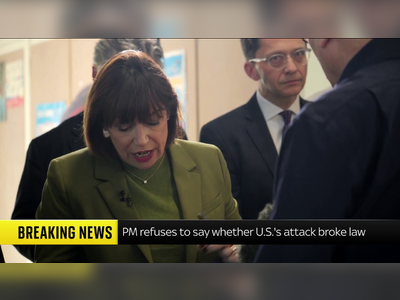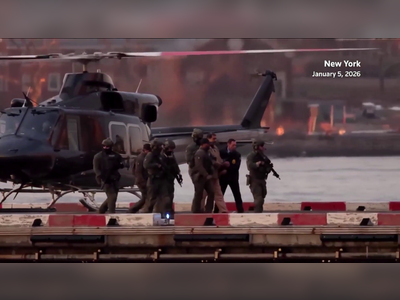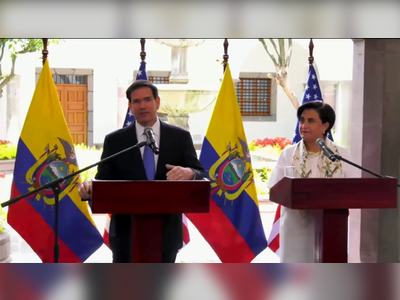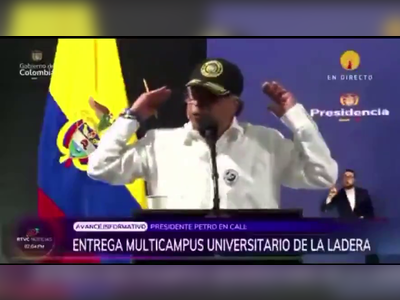
Ukraine got its tanks. Now it wants jet fighters too
For Ukraine, the struggle to secure Western battle tanks was just the start.
With U.S.-built Abrams and German-made Leopards now headed for the front line following months of bickering among Western allies, military planners in Kyiv are turning their attention to what they see as the logical next step in their effort to repel Russian invaders — shipments of modern fighter jets.
Conversations with more than half a dozen Western military officials and diplomats confirm an internal debate about supplying Ukraine with jet fighters is already underway, pushed by Ukrainian officials with support from hawkish Baltic states.
“The next natural step would be fighters,” a diplomat from a northern European country said.
The debate will likely prove even more contentious than the row over supplying tanks. In Europe, multiple officials and diplomats said their governments no longer consider the idea a non-starter, but that fears of escalation remain high.
Washington has told Kyiv that supplying aircraft is a “no-go, for the moment,” the diplomat quoted above said, but added: “There’s a red line there — but last summer we had a red line on the HIMARS [multiple rocket launchers], and that moved. Then it was battle tanks, and that’s moving.”
A second senior envoy from a European power also stressed the speed at which the supply of Western weaponry is escalating. “Fighters are completely unconceivable today,” they said, “but we might have this discussion in two, three weeks.”
Defense ministers from Ukraine’s allies are due to hold a further summit next month at the U.S. military base of Ramstein, in southwest Germany, where aviation and air support are expected to be a key focus.
Dutch Foreign Affairs Minister Wopke Hoekstra told the Dutch parliament last week that his Cabinet would look at supplying F-16 fighter jets, if Kyiv requests them. “We are open-minded, there are no taboos,” he said.
That followed comments last month from Slovakian Foreign Affairs Minister Rastislav Káčer, who told Interfax-Ukraine that his government was “ready” to hand Soviet-era MiG-29 fighters to Kyiv, and was talking with NATO partners and Ukrainian President Volodymyr Zelenskyy about how to do so.
Other senior politicians are significantly less gung-ho. German Chancellor Olaf Scholz ruled out fighter jet deliveries Wednesday, citing the need to prevent further military escalation.
“There will be no fighter jet deliveries to Ukraine,” he said. “This was made clear very early, including from [the] U.S. president.”
Some officials believe next month’s discussion at Ramstein will therefore be more focused on thrashing out a contingency plan, in case jet fighters are urgently needed at some future point, rather than on striking a deal on near-term deliveries.
Ukraine’s European allies foresee a conflict that could last three to five more years, or longer, and there are concerns the West is close to the limit of what can be provided without triggering an extreme response from Moscow.
Steady escalation
Early last year Western allies agreed an “unwritten policy” not to supply Ukraine with a fully comprehensive package of weapons immediately after the invasion, out of fear “we would trigger a big response from Russia,” a third senior diplomat from another European government said.
The thinking was that the West should provide its support gradually, assessing the Russian response at every step.
“Many countries in the West think that if we were to supply Ukraine with all the hardware they asked us [for] in the first phase of the war, there would be a strong Russian reaction, including nuclear. You may call this a process of getting [Putin] accustomed,” the diplomat said.
The strategy has been a slow but steadily upward trend in Western support, from anti-tank Javelins and portable air-defense systems such as Stingers, to HIMARS, and more recently surface-to-air Patriot missiles, tanks and armored vehicles.
The delivery of aircraft is therefore “only a matter of when,” the same diplomat predicted.
British Foreign Secretary James Cleverly met senior U.S. officials in Washington last week to discuss further military support to Ukraine, beyond the supply of tanks. Speaking afterward, Cleverly refused to say whether those conversations covered the supply of fighter jets, cluster bombs or long-range missiles.
“I am not going to speculate as to what the nature of future military support would be,” he said. “Our support has evolved as the battle has evolved, and as the requirements of the Ukrainians have evolved.”
As an island nation, however, Britain would be more reluctant to send aircraft to Ukraine than it has to send tanks and other land-based military equipment, U.K. officials say. There are concerns too that public support may wane amid further escalation.
European diplomats agree the West will first want to exhaust all other options for air support, including more attack drones and possibly long-range missiles. Washington also recently approved a consignment of Cold War-era Zuni unguided rockets that the Ukrainian army could launch from its Soviet-era MiG planes.
But these envoys also pointed to recent U.S. decisions as evidence that Washington is preparing for a discussion on aircraft.
In July, the U.S. House of Representatives approved $100 million for training Ukrainian pilots to fly U.S. fighter jets, and in October Ukraine announced a group of several dozen pilots had been selected for training on Western fighter jets.
In August, Colin Kahl, undersecretary of defense policy, told reporters that “it’s not inconceivable that down the road, Western aircraft could be part of the mix” of weaponry provided to Ukraine.
Yuriy Sak, an adviser to Ukrainian Defense Minister Oleksii Reznikov, said Kyiv’s priority after tanks is to secure jet aircraft and that its allies’ “excuses” are not insurmountable. He is convinced the West is now persuaded of the need to carefully but consistently increase the sophistication of its military donations.
He said the Ukrainian air forces have set their eyes on American F-16 and F-15 aircraft, but are open to others too. The majority of the F-15s and F-16s owned by the U.S. are deployed in other regions, including the Indo-Pacific.
“There are almost 50 countries which are currently using F-15s,” Sak said. “I don’t believe for a second that Ukraine doesn’t deserve combat aircraft.”
Logistical nightmare
Sending aircraft would be a serious logistical undertaking for Ukraine’s allies, however.
F-15s and F-16s require long, high-quality runways, which Ukraine lacks. Experts say it would be easy for Russia to spot any attempt to build operational bases, and strike them.
American F-18 fighters or Swedish-made Gripens would be more appropriate, said Justin Bronk, senior research fellow for airpower at the British think tank RUSI, as they can take off from shorter landing strips and require less maintenance. But both jets are in relatively short supply.
Swedish Defense Minister Pål Jonson told POLITICO Wednesday that Sweden has “no immediate plans to send the Gripen to Ukraine.”
Other combat jets, such as French-made Rafales, may require significant numbers of Western civilians on the ground in Ukraine to repair the aircraft and prepare them for flights. These people would automatically become targets for Russian attacks.
But asked if donating jets would constitute an escalation, a French government official pointed out that Ukraine has already received “super violent” weapons from the West, such as Caesar canons.
“We say everything we send must be for defensive purposes — but once the equipment has been delivered, it’s in their hands,” the official said. “The argument [that you would need NATO officers in Ukraine] was the same for the Patriots. We still sent them.”
Comments












